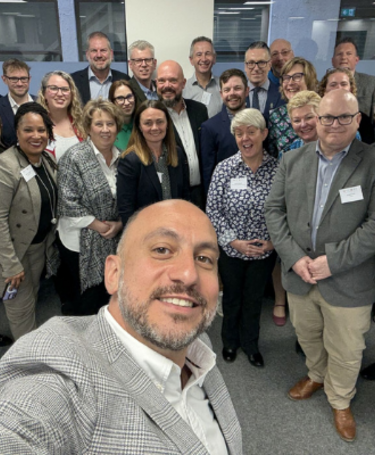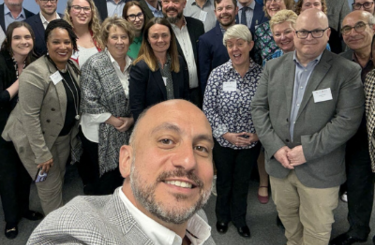
Disruption, innovation and strategic quality

Dave Smith, Chair, CQI Council, reflects on the CQI’s 2025 Council meeting. Bringing together elected CQI members and external stakeholders, the Council discussed the impact of global disruption, the role of quality in innovation and the challenges of positioning quality management as a strategic force for organisations and economies.
The CQI Council
The Council performs an important role in advising the CQI Board of Trustees on strategic direction. It supports the CQI in delivering on its Royal Charter purpose to promote quality management for society’s benefit and in electing trustees.
Council members
The CQI Council is made up of ordinary members elected by voting CQI members and stakeholder members elected by ordinary members. Stakeholder members provide input and insight from allied quality bodies, professional bodies, trade associations, regulators, government, and academia. Explore our list of current members here.
2025 CQI Council meeting
The 2025 council meeting took place on 9 April in London. We focused on three topics.
- Geopolitical disruption: the impact this trend is having on the ability of organisations, sectors and economies to deliver and improve quality outputs.
- Quality as a strategic tool for economies: the barriers to, and options for achieving the six points suggested by the CQI in our response to the UK government's plans for a new industrial strategy.
- Innovation: the extent to which quality management can help organisations innovate, especially in terms of digital and sustainable quality.
The second annual CQI Council meeting was exceptionally informative and engaging. Welcoming new members, including from our international community, provided a valuable dimension in our discussions as we built on our work over the last year.
Dave Smith, Chair, CQI Council
Key takeaways
Geopolitical disruption
The Council confirmed that, depending on sector, we are witnessing the impact of tariffs and other global events on supply chains and access to markets. This is challenging organisations and sector ability to ramp-up and ramp-down capacity and capability at pace, and without compromising quality.
Agile business improvement and innovation, which was already becoming a strategic imperative, has been accelerated by the current operating environment in 2025. Organisations with a long-term view are investing in improvement and innovation.
The trend toward global fragmentation and protectionism may put pressure on the ‘one certification accepted by all’ concept and require organisations to provide multiple certifications. This will add to the impact of industry sectors spinning off standards variants to meet specific needs. To an extent, these trends will compromise the efficiency inherent in the global standards concept.
United across geographical boundaries, the Council's collective action and discussions on macro trends and their profound impact on businesses and societies are inspiring and energising. Collaboration between private and public sectors is charged with opportunities to enhance productivity, efficiency and effectiveness.
Rashad Issa, Chair, CQI Board of Trustees
Quality as a strategic tool for economies
While the Council accepted that there are clear examples of the competitive value of quality management, these are not well known in the wider economy. Especially in the current operating context, quality management urgently needs to be seen to help ‘getting stuff done’ and providing sustainable value, moving away from the ‘tick box’ perception.
Poor culture will compromise quality outcomes. Economies need quality leaders who can establish quality cultures and people with a sense of aptitude and expertise, and the personal responsibility to deliver quality outcomes.
Innovation quality
The Council recognised that trust in innovation requires the application of risk-based thinking to mitigate poor outcomes and drive positive ones. Innovation (digital, sustainable or otherwise) should be focused on humans creating value for humans, and quality management must bring the people, process and technology elements together.
The application of quality thinking for planning, assurance and control is now more relevant and challenging with complex non-physical assets, and we must avoid relying on ungoverned digital-driven decision-making. However, we need to question if the traditional quality principles are still valid and how digital and sustainability sit as part of those principles.
There are major opportunities in terms of value provision and efficiency for radically improving public services through quality management.
Dave Smith, Chair, CQI Council
Action points
- Quality practice: We need to review established quality principles and practices and ensure the quality management toolset and profession are innovation-ready.
- Professional diversity: We urgently need to engage new skills and mindsets, especially the next generation of quality professionals and data scientists, to ensure the profession is innovation-ready.
- Value of quality management: The economy needs help understanding the value of managing and improving quality through case studies and data examples, and in non-traditional formats.
- Standards: We must advocate for non-prescriptive, principles-based standards to support performance improvement and innovation.
Next steps
The CQI Board of Trustees will review the detailed advice and suggestions from the Council at its next meeting as part of its ongoing strategy review. The feedback is especially pertinent to how we achieve our vision of quality management and the quality profession (see CQI 2030 Strategy).
Thank you
I would like to express our sincere gratitude to all ordinary and stakeholder members for their invaluable contributions and collaborative spirit. This was my last meeting as Chair of the Council and I thank all members of this, and the previous Membership Council for their dedication, commitment and support of the CQI and the quality profession.
Learn more about the CQI Council.
Our 2030 strategy
Providing access to shared expertise, knowledge, and exclusive benefits, we strengthen and position our profession to lead a quality-driven culture, embrace digital transformation, and deliver on sustainability goals.
Become a member
Take your quality career to the next level by becoming a member of the CQI or an IRCA Certificated Auditor.
